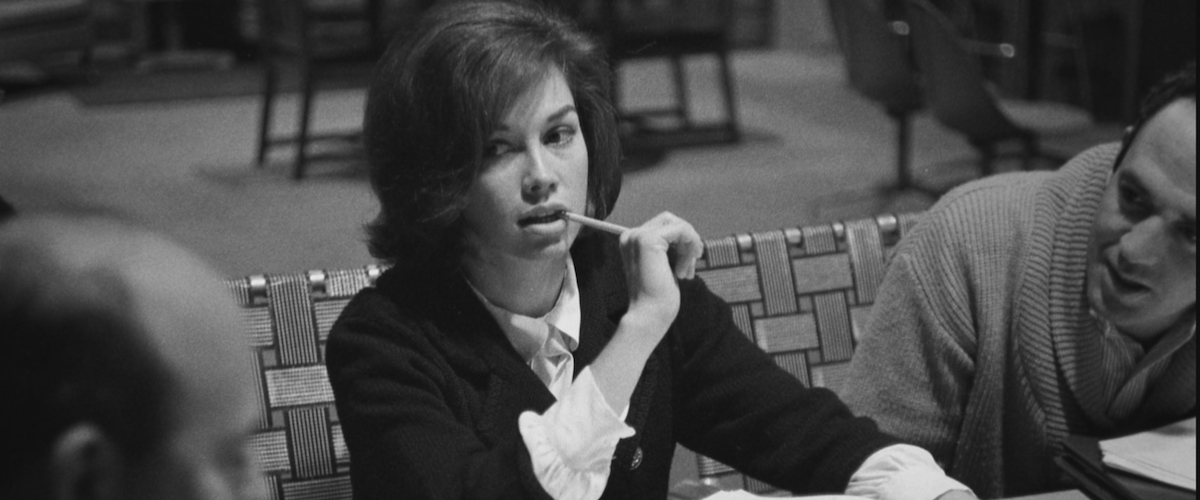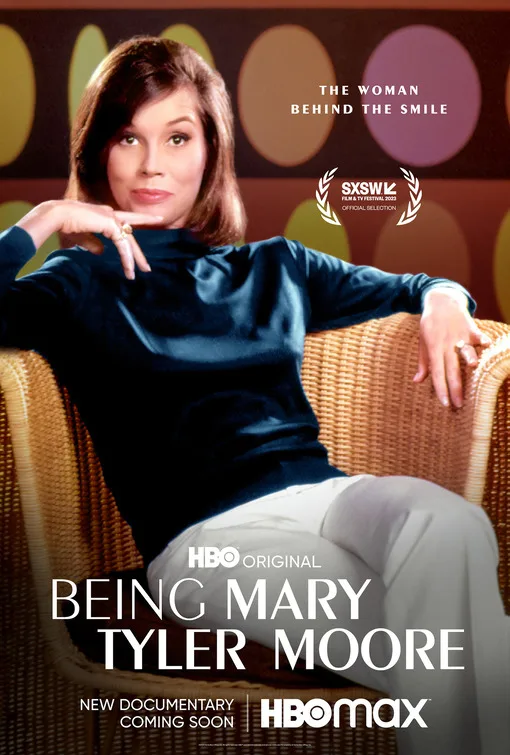Robert Redford saw Mary Tyler Moore walking on the beach and realized that the woman who had created two iconic television characters known for sunny cheerful outlooks, both, she said, very close to her own personality, had a darker quality audiences had never seen. Redford cast her in “Ordinary People” as Beth, a mother from the posh suburbs whose implacable sheen of pleasant congeniality cracked after one of her sons was killed in an accident. “Being Mary Tyler Moore” is a documentary about the life of one of television’s most beloved stars. The transition from sitcoms to prestige drama is only one of the shifts she made throughout her career as she responded to cultural changes and her growing awareness of her potential.
The film begins with David Susskind interviewing Moore in the 1960s about her role as Laura Petrie on “The Dick Van Dyke Show.” His questions are shockingly offensive by today’s standards, as he condescendingly discourses on how women stop listening to men after they get married. He describes Laura’s sweetness and satisfaction with her life as a full-time wife and mother as impossibly idealized. Moore stays calm but firm and makes it clear that, first, Laura was far from perfect, and second, she herself agreed with Betty Friedan, one of the founders of the women’s movement, that the ideal was being “a human first, a woman second, and wives and mothers third.”
The documentary has several archival clips from other televised interviews. One brief exchange with David Letterman has Moore smiling as she sets firm boundaries around what she wants to reveal about herself. Extended clips from a long Rona Barrett interview show her openness to revealing, introspective conversations. Later interviews, especially those about her alcoholism and her blissful third marriage, to a doctor 18 years younger than she was, are even more candid. When he is behind the camera, it is as though she is looking at us with love brimming from her every pore.
That doctor, Robert Levine, is a producer of this documentary, which means that the filmmakers had access to home movies. Many are taken by him, which gives us the truest sense of Moore in intimate settings, with friends and her mother at her bridal shower, on the farm she shared with Levine and her horses and dogs. In those moments, she’s relaxed and not trying to perform for anyone, though in one moment, she apologizes for not wearing makeup.
It is difficult in 2023 to understand how revolutionary Laura Petrie and Mary Richards were for audiences in the 1960s and ’70s. We get a sense of it from Susskind’s misogynistic questions and hearing that the network executives did not want Laura to wear pants and then agreed only if they did not “cup” her derriere. (Sitcom housewives of the ’60s vacuumed and dusted in dresses, heels, and pearls.) The suits would not allow Mary Richards to be a divorcee and fussed over a subtle indicator that she was sexually active.
However, the documentary does not focus on the most revolutionary aspects of the Petries. The other TV wives were deferential to their husbands. When Lucy Ricardo got in trouble, she acted like a naughty child, even referring to her real-life and on-screen husband as “sir.” Rob and Laura had a unique relationship on television. They had a true partnership. They listened to one another. They supported one another. Each was equally comfortable playing straight and comedy off each other. And they were clearly very hot for each other despite the twin beds required by network standards in those days. The film does better with the also-unprecedented portrayal of Mary Richards as a working woman, growing in skill and confidence. She did not need to have a man in her life, though enjoying a few when they came along. We hear from Katie Couric, Rosie O’Donnell, and Julia Louis-Dreyfus, who were transfixed and inspired by Mary Richards.
I hope this will lead audiences to her performances in two of the best television sitcoms of all time (start with these episodes: “Laura’s Little Lie,” “The Curious Thing About Women,” “Coast to Coast Big Mouth,” “Chuckles Bites the Dust,” and “The Snow Must Go On”). And I hope some will find their way to some of Moore’s lesser-known work, including the hilarious dark comedy “Flirting with Disaster,” the must-be-seen-to-be-believed “Change of Habit,” with Moore as a hip nun working with Elvis Presley as an even more hip inner city doctor, and “Like Mother, Like Son,” the over-the-top true crime story of a con artist who directed her son to commit murder.
Levine’s involvement, and director James Adolphus’ admission in interviews that he was unfamiliar with Moore’s work before this project, leave the film lopsided. (Producers Lena Waithe and Debra Martin Chase specifically picked Adolphus because they thought he would be more objective.) “Being Mary Tyler Moore” will likely leave both ardent fans, including myself, and newcomers feeling unsatisfied. Perhaps objectivity was not as important as understanding her cultural impact and appeal. This may be why many of the archival clips of the television series and her film work are more “best of” reels than a complement or commentary on the narrative, as was done so effectively in the recent Michael J. Fox documentary.
There are some telling behind-the-scenes details and warm accolades in audio commentary from Ed Asner, Carl Reiner, Rob Reiner, and Larry Mathews (who played her son on “The Dick Van Dyke Show”). And we see where that darkness Redford noticed comes from, as Moore deals with professional setbacks and personal tragedy, and then with her own need for authenticity, and the way that led her to love and—this can feel like the bigger risk—allow herself to be loved. That’s something the Petries and Mary Richards would understand. Mary Tyler Moore knew how to play confident, happy, honest women early in her career, and it is good to see how she finally learned how to be one.
Now playing on Max.




















